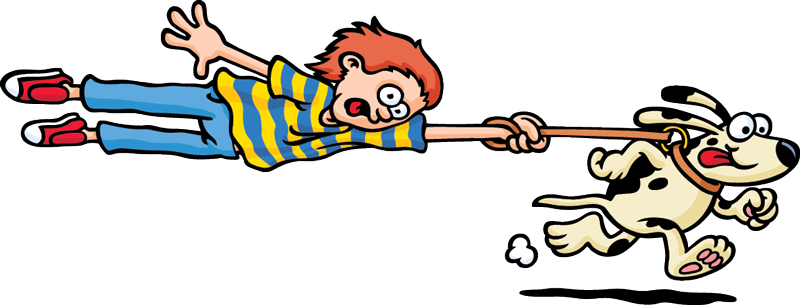This is an excerpt from Chapter 1 of Puppies chew shoes, don't they?
Your puppy arrived five minutes ago. You plunked the
little darling in the middle of the floor for all to adore and ... he peed. You
admire the fact that his plumbing works. He turns, snags your pant leg (it was
the closest thing to him) and pulls. You screech, laugh, and disengage puppy
from your clothing.
Fast forward a few weeks and Cute Adorable Puppy has used
your entire house as a toilet, pooping and peeing wherever he chooses. He has
destroyed two books, a shoe, the remote, your favorite Rolling Stones CD, most
of a pillow, three rolls of toilet paper, and is working on gnawing through the
legs of your dining room table. Do you have a bad puppy? A stupid puppy? A
normal puppy?
Answers: No. Probably not. Yes.
So what’s up with all this? To start with, your puppy:
- Came to this unfamiliar place – your home – without his mom or siblings and he’s adjusting
- Doesn’t know what “go potty” means (language again)
- Has no idea what language you’re speaking (think English-speaking American in Moscow, trying to understand Russian)
- Hasn’t a clue what a collar and leash are, much less why he’s forced to wear them
- Sleeps, plays, poops, pees, eats ... and then does it all over again
- Is a baby, so cut him some slack
# # #
Time to rewind the tape. Your new puppy will arrive in a
week. What should a responsible pet parent do to prepare?
Puppy-proof your house. Get on your hands and knees to
look at your house from a puppy’s perspective. Even if you tether your puppy to
you and properly crate train him, sometime in his youth he will escape your
watchful eye and destroy something you are fond of – if it is within his reach.
Starting now, make sure “it” isn’t within his reach.
Since you have been warned, when your puppy rips apart a
pair of $100 shoes, here’s what you do: roll up a newspaper and smack yourself
upside the head. It’s YOUR fault, not his! Why? Because Rule #3 is: "If it fits
in his mouth and he can reach it, it will go in his mouth". And there are teeth
in there. Sharp ones that can destroy an amazing array of your things. So the answer to the question “Puppies chew shoes, don’t they?” is
... absolutely! In addition to shoes, puppies will happily chew:
- Computer cables and electric cords
- Articles of clothing (dirty laundry is a puppy favorite)
- Sporting equipment
- Children’s toys
- Books, magazines, newspapers, DVDs, CDs, homework
- Fingers, arms, toes, legs
- Other family pets
- Pant legs and chair legs
- Remote controls
- iPhones, iPods, & other iStuff
- Eye glasses
- Leashes and collars
- Contents of litter boxes (dog candy)
- Food of any kind – dog, cat, bird, gerbil, fish, human
- Plants (warning: some houseplants are toxic to dogs)
- Anything at puppy nose level
What to do to prevent total destruction of your worldly
possessions?
For starters, there should be a gate at every stairway. Google
“baby gates” to find gates that will work in your home. Next, choose a room
where puppy is allowed (kitchens often work well) and close doors to all other
rooms. Use baby gates to block access to areas without a door.
Puppy should have limited access to your home until he is
old enough to exhibit self-control. How old is that? For some puppies it will
be around six months – when teething is finished. For others it will be
sometime in young adulthood. For still others, the day may never come. Know
your puppy. If you try allowing him to roam your downstairs alone when he’s
seven months old and he destroys something ... you have acted too soon.
Oh, and all trash cans should be out of reach. Raiding
them is self-rewarding for a puppy and once he has experienced trash can
delights, it’s challenging to get him to stop.
Outdoors.
If you have a pool, make sure the puppy cannot get in it without
supervision. Introduce puppy to your pool carefully, showing him how to get
out, as well as how to get in. Those stairs are obvious to you but not to your
puppy. Puppies have no depth perception, which is why one will occasionally try
to walk on water. This can result in a very surprised puppy when he is suddenly
under water. It can also result in a
scared puppy who may never go near water of any kind again (think beach
vacation). So ease him into the pool supporting his chest and belly. A floating
long line attached to his collar will insure his safety. Swimming is one of the
best ways to exercise your puppy, so make his first pool experience a happy
one.
Yards are full of things puppies like to investigate. Make
sure anything poisonous (fertilizer, antifreeze, etc.) is out of reach. If your
yard is fenced in, make sure there are no spaces a puppy can squeeze through.
Put the gardening tools away. Their handles make wonderful chew toys. Understand
that if you have a yard, your new pal may dig holes, bed down in the flowers,
chew the corners off of your deck steps, and bark at everything from
butterflies to falling leaves. He may eat dirt and rocks and parts of trees. He
is, after all, a puppy.
# # #

